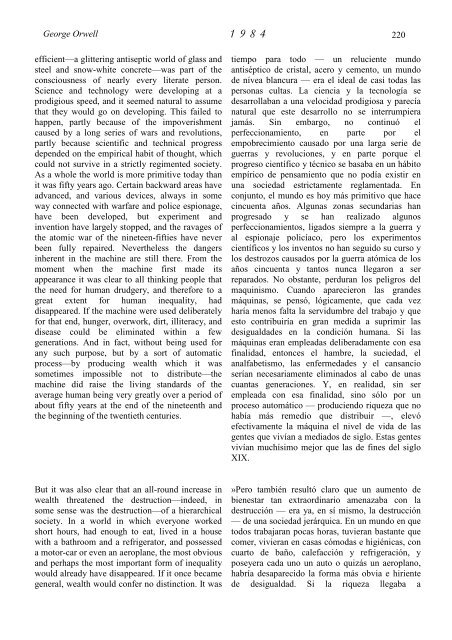Create successful ePaper yourself
Turn your PDF publications into a flip-book with our unique Google optimized e-Paper software.
George Orwell 1 9 8 4<br />
efficient—a glittering antiseptic world of glass and<br />
steel and snow-white concrete—was part of the<br />
consciousness of nearly every literate person.<br />
Science and technology were developing at a<br />
prodigious speed, and it seemed natural to assume<br />
that they would go on developing. This failed to<br />
happen, partly because of the impoverishment<br />
caused by a long series of wars and revolutions,<br />
partly because scientific and technical progress<br />
depended on the empirical habit of thought, which<br />
could not survive in a strictly regimented society.<br />
As a whole the world is more primitive today than<br />
it was fifty years ago. Certain backward areas have<br />
advanced, and various devices, always in some<br />
way connected with warfare and police espionage,<br />
have been developed, but experiment and<br />
invention have largely stopped, and the ravages of<br />
the atomic war of the nineteen-fifties have never<br />
been fully repaired. Nevertheless the dangers<br />
inherent in the machine are still there. From the<br />
moment when the machine first made its<br />
appearance it was clear to all thinking people that<br />
the need for human drudgery, and therefore to a<br />
great extent for human inequality, had<br />
disappeared. If the machine were used deliberately<br />
for that end, hunger, overwork, dirt, illiteracy, and<br />
disease could be eliminated within a few<br />
generations. And in fact, without being used for<br />
any such purpose, but by a sort of automatic<br />
process—by producing wealth which it was<br />
sometimes impossible not to distribute—the<br />
machine did raise the living standards of the<br />
average human being very greatly over a period of<br />
about fifty years at the end of the nineteenth and<br />
the beginning of the twentieth centuries.<br />
But it was also clear that an all-round increase in<br />
wealth threatened the destruction—indeed, in<br />
some sense was the destruction—of a hierarchical<br />
society. In a world in which everyone worked<br />
short hours, had enough to eat, lived in a house<br />
with a bathroom and a refrigerator, and possessed<br />
a motor-car or even an aeroplane, the most obvious<br />
and perhaps the most important form of inequality<br />
would already have disappeared. If it once became<br />
general, wealth would confer no distinction. It was<br />
220<br />
tiempo para todo — un reluciente mundo<br />
antiséptico de cristal, acero y cemento, un mundo<br />
de nívea blancura — era el ideal de casi todas las<br />
personas cultas. La ciencia y la tecnología se<br />
desarrollaban a una velocidad prodigiosa y parecía<br />
natural que este desarrollo no se interrumpiera<br />
jamás. Sin embargo, no continuó el<br />
perfeccionamiento, en parte por el<br />
empobrecimiento causado por una larga serie de<br />
guerras y revoluciones, y en parte porque el<br />
progreso científico y técnico se basaba en un hábito<br />
empírico de pensamiento que no podía existir en<br />
una sociedad estrictamente reglamentada. En<br />
conjunto, el mundo es hoy más primitivo que hace<br />
cincuenta años. Algunas zonas secundarias han<br />
progresado y se han realizado algunos<br />
perfeccionamientos, ligados siempre a la guerra y<br />
al espionaje policíaco, pero los experimentos<br />
científicos y los inventos no han seguido su curso y<br />
los destrozos causados por la guerra atómica de los<br />
años cincuenta y tantos nunca llegaron a ser<br />
reparados. No obstante, perduran los peligros del<br />
maquinismo. Cuando aparecieron las grandes<br />
máquinas, se pensó, lógicamente, que cada vez<br />
haría menos falta la servidumbre del trabajo y que<br />
esto contribuiría en gran medida a suprimir las<br />
desigualdades en la condición humana. Si las<br />
máquinas eran empleadas deliberadamente con esa<br />
finalidad, entonces el hambre, la suciedad, el<br />
analfabetismo, las enfermedades y el cansancio<br />
serían necesariamente eliminados al cabo de unas<br />
cuantas generaciones. Y, en realidad, sin ser<br />
empleada con esa finalidad, sino sólo por un<br />
proceso automático — produciendo riqueza que no<br />
había más remedio que distribuir —, elevó<br />
efectivamente la máquina el nivel de vida de las<br />
gentes que vivían a mediados de siglo. Estas gentes<br />
vivían muchísimo mejor que las de fines del siglo<br />
XIX.<br />
»Pero también resultó claro que un aumento de<br />
bienestar tan extraordinario amenazaba con la<br />
destrucción — era ya, en sí mismo, la destrucción<br />
— de una sociedad jerárquica. En un mundo en que<br />
todos trabajaran pocas horas, tuvieran bastante que<br />
comer, vivieran en casas cómodas e higiénicas, con<br />
cuarto de baño, calefacción y refrigeración, y<br />
poseyera cada uno un auto o quizás un aeroplano,<br />
habría desaparecido la forma más obvia e hiriente<br />
de desigualdad. Si la riqueza llegaba a


